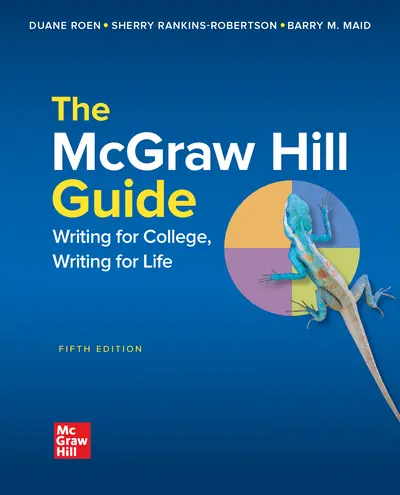My Account Details

ISBN10: 1264115016 | ISBN13: 9781264115013

* The estimated amount of time this product will be on the market is based on a number of factors, including faculty input to instructional design and the prior revision cycle and updates to academic research-which typically results in a revision cycle ranging from every two to four years for this product. Pricing subject to change at any time.
Instructor Information
Quick Actions (Only for Validated Instructor Accounts):
With The McGraw Hill Guide, students apply a goals-oriented, purpose-based approach to their writing assignments and practice the habits of mind of engaged students. Using proven techniques derived from the Frameworks for Success in Postsecondary Writing, The Guide encourages students to understand the underlying principles on which their writing is assessed by offering reflective opportunities for students to assess themselves. In doing so, students will develop the strategies needed to transfer these skills throughout their coursework and long after they have completed college.
Structured to help students set, achieve, and assess their writing goals, The Guide encourages students to transfer the knowledge they develop to assignments across the disciplines, and apply it to their personal, civic, and professional lives.
1 Writing Goals and Objectives for College and for Life
2 Reading Critically for College and for Life
3 Writing to Understand and Synthesize Texts
4 Writing to Discover and to Learn
Part 2: Using What You Have Learned to Share Information
5 Writing to Share Experiences
6 Writing to Explore
7 Writing to Inform
8 Writing to Analyze
Part 3: Using What You Have Learned to Write Arguments
9 Writing to Convince
10 Writing to Evaluate
11 Writing to Explain Causes and Effects
12 Writing to Solve Problems
Part 4: Strategies for Effective Communication
13 Using Strategies that Guide Readers
14 Using Strategies for Argument
15 Using Strategies for Collaboration
16 Making Effective Oral Presentations
Part 5: Technologies for Effective Communication
17 Choosing a Modality, Genre, and Technology for Your Communication
18 Communicating with Design and Visuals
Part 6: Using Research for Informed Communication
19 Finding and Evaluating Information
20 Synthesizing and Documenting Sources
Connect Chapters
21 Writing about Visual Texts
22 Writing about Creative Works
23 Strategies for Success in College
Appendix A Constructing a Writing Portfolio
Appendix B Writing Effective Essay Examinations
Appendix C Business Writing Professional Models
Need support? We're here to help - Get real-world support and resources every step of the way.